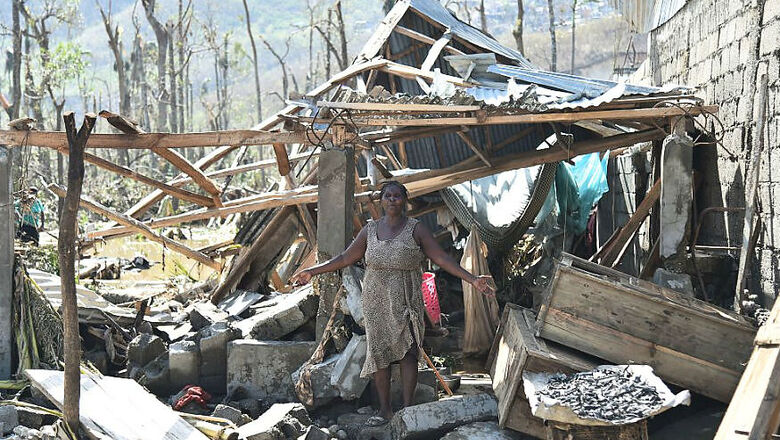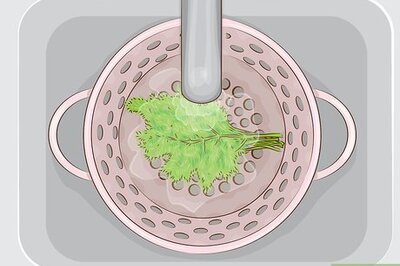
views
Jeremie (Haiti): People across southwest Haiti were digging through the wreckage of their homes, salvaging what they could of their meagre possessions after devastating Hurricane Matthew killed over 800 people and created a new crisis for the impoverished country.
“My home is totally wrecked and I heard they were bringing food,” said 22-year Richard David, one of those who came to the airport. “I haven't had anything but water today and I'm hungry.”
The country's Civil Protection Agency said the death toll was still at nearly 300, but officials conceded it was likely higher because the central government had not received totals from much of the Grand Anse region because communications were still largely down across the rural and mountainous area.
Saint-Victor Jeune, an official with the Civil Protection agency working in Beaumont, in the mountains on the outskirts of hard-hit Jeremie, said 82 bodies found by his team had not been recorded by authorities in the capital because of spotty communications. Most appeared to have died from falling debris from the winds that tore through the area at 235 kmph on Tuesday.
"We don't have any contact with Port-au-Prince yet and there are places we still haven't reached," Jeune said, as he and a team of Civil Protection agents in orange vests combed the area.
The storm left signs of devastation all around the southwestern peninsula. Outside the coastal town of Jeremie, home after home was in ruins. Drew Garrison, a Haiti-based missionary who flew in Friday, said several fishing villages along the coast were submerged and he could see bodies floating in the water.
"Anything that wasn't concrete was flattened," said Garrison, whose organisation, Mission of Hope Haiti, based in Austin, Texas, was bringing in a barge loaded with emergency supplies on Saturday. "There were several little fishing villages that just looked desolate, no life."
The Pan American Health Organization and others warned of a surge in cholera cases because of the widespread flooding caused by Matthew. Haiti's cholera outbreak has killed roughly 10,000 people and sickened more than 800,000 since 2010, when it was introduced into the country's biggest river from a UN base where Nepalese peacekeepers were deployed.
Sophia Cheresal, deputy medical coordinator of Doctors Without Borders in Haiti, said there were at least 18 cases of cholera at the Jeremie hospital. "It's getting worse and probably some people are going to die."
Solette Phelicin, a mother of five who lost her home and her small fruit and vegetable plot, watched from her yard as UN peacekeepers patrolled the small air strip. She said they were hungry and desperately in need of food. "Jeremie might get rebuilt after I'm dead, maybe, but I doubt it."
As Haitians mourned their losses, they tried to recover what they could of their belongings. Homes throughout the area were piles of rubble, the roofs mangled or stripped away.
Officials were especially concerned about the department of Grand-Anse on the northern tip of the peninsula, where they believe the death toll and damage is highest.
Emmanuel Pierre, an Interior Ministry coordinator in Les Cayes, told The Associated Press late Thursday that authorities had counted 283 people dead in one part of Haiti's hard-hit southwest, but that did not include Grand-Anse or its surrounding areas.
Death tolls are frequently difficult to tabulate in the immediate aftermath of a natural disaster in any country, though it is particularly difficult in remote and mountainous southwest Haiti.
When Category 4 Hurricane Flora hit Haiti in 1963, it killed as many as 8,000 people.
More bodies began to appear as waters receded in some places two days after Matthew's 235 kmph winds smashed concrete walls, flattened palm trees and tore roofs off homes, forcing thousands of Haitians to flee.
Those killed in Haiti included a woman and her six-year-old daughter who frantically abandoned their flimsy home and headed to a nearby church to seek shelter as Matthew surged in early Tuesday, said Ernst Ais, mayor of the town of Cavaillon.
"On the way to the church, the wind took them," Ais said.
Haiti's government has estimated at least 350,000 people need some kind of assistance in what is likely to be the country's worst humanitarian crisis since the devastating earthquake of January 2010.
International aid groups are already appealing for donations for a lengthy recovery effort in Haiti, the hemisphere's least-developed and most aid-dependent nation.
Before hitting Haiti, the storm was blamed for four deaths in the Dominican Republic, one in Colombia and one in St. Vincent and the Grenadines.



















Comments
0 comment